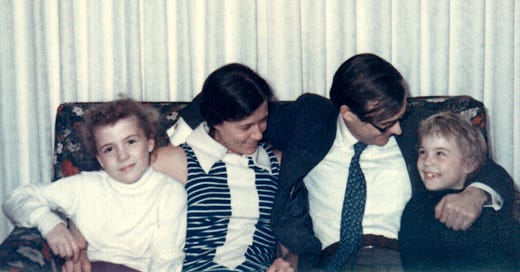The author (far right) with her family: Sarah Chace, Jean Valentine, James Chace, shortly after her parents’ second marriage. Photo: Maggie Valentine
All that’s left is to close the door and click the padlock, but this cold metal storage facility suddenly looks like a church. Facing me are two rows of white boxes with a narrow path down the center. I’m the idiot who’s been paying rent on this unit for nearly twenty years, and I’ve just taped handwritten labels at the front of each aisle: “Mom” and “Dad.”
In the space of a decade, my parents married each other four times and divorced twice. They’re both gone now, but their books have finally gotten back together.
Keep reading with a 7-day free trial
Subscribe to Book Post to keep reading this post and get 7 days of free access to the full post archives.




